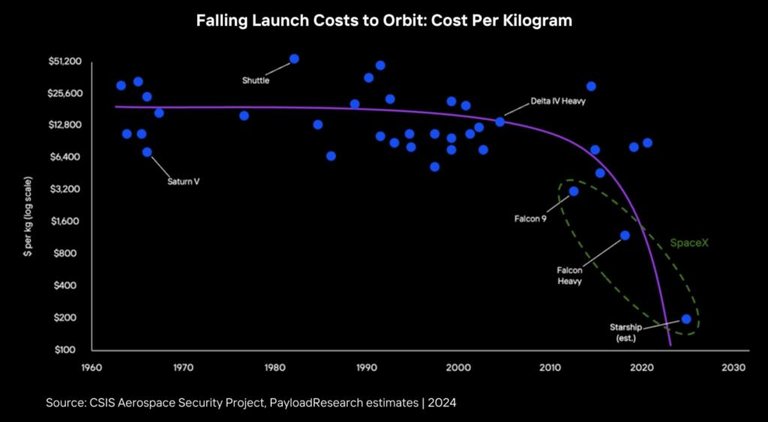Elon Musk is looking at disrupting another industry. This is one that doesn't get a great deal of attention but the math, if achieved, works out.
Most are familiar with SpaceX and the Starlink project. Here we have one of the company's commercial services. It gets a lot of attention because it deals with the end consumer.
What gets a bit less attention but is equally as crucial is the rocket services. Right now, it provides launches, carrying cargo into space. Much of that is for itself, delivering the satellites to space. It does, however, provide the services to other companies and has made trips to the International Space Station (ISS).
Why is SpaceX the dominant player in this arena? One simple answer: cost.
By shifting to reusable rockets, the company has reduced the cost of cargo going to space. This, as they say, is only the beginning.

Not Only For Space
SpaceX is looking to get the cost of orbital launch down to $10/kg. This is due, in part, to the reusable rocket technology. analysts have worked different scenarios of what the price could be pushed down to. Here is one that details the math of how to get to the $10/kg level.
This would be an impressive number of an orbital launch. It gets even crazier when dealing with a point-to-point Earth rocket delivery. It was stated the orbital cost will be about 4 times that of Earth rocket delivery.
That puts the cost down to $2.50/kg.
What does this mean? To most, the numbers aren't very telling.
Here is the zinger. A cost of air cargo rates typically runs $3.00-$7.00 per kg. We could be looking at a cost savings by moving cargo around the world on a rocket as opposed to planes.
Naturally, not everything will be moved like this and ships will still have most of the cargo. However, this could be a major disruption.
Will the numbers ever get there? That is what we will have to watch.
Reuse Is The Key
The key to this is going to be how much reuse can be gotten out of each rocket.
Here is where we enter simple math. If a rocket gets 20 uses, that is a much higher cost as compared to 100. It is a 5x. SpaceX has the goal to increase the number of times a rocket can be used. Right NOW they are tending towards the 20 although the next generation Starship and booster technology is thought to see higher reuse rates.
Another factor is to get the percentage of the launch related to fuel down. If this can be done, the variable costs will diminish which means the fixed costs, if spread over more flights, will drive an overall decline.
The breakthrough of reusable rockets will factor in a big way over the next few decades. As we can see, this is about more than just space. We could see this impact commerce on Earth.
Can these starships fly thousands of times like planes do? That is going to be the challenge.
Many futurists have discussed a future where not only is cargo shuttled around the world with rockets but also people. The times to go from Tokyo to New York City would be under 30 minutes.
What happens when the airline industry loses the long haul business? This would cause a great deal of disruption.
It will become a reality if SpaceX has anything to do with it.
Posted Using InLeo Alpha
This is an interesting concept. I don't know what would require rocket delivery, but if they can keep the cost down, then I can see it being used. My concern is the the wear and tear of the materials. Because of the higher speed, it might degrade faster than planes. If they will use/recycle rocket parts that were used in outer space travel but can no longer be used for outer space, that can cut down on trash and costs.
wow this is a very ambitious plan. let's see if they pull it off. goodbye to airplanes. let me get on the starship O.O to go across the world
It will be so lovely to see this great plan come through we keep upgrading every day
I think the company has realise that it might not be time yet to send cargo to the space as it looks like. But this is really an ambitious plan actually